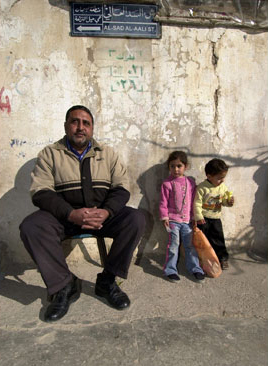The authorities in Amman have said they will no longer issue or extend residency permits to Iraqis who are resident in the kingdom legally or illegally. A deadline by which Iraqis were supposed to get their paperwork in order expired on 17 June 2008.
Jordan is not a signatory to the 1951 Refugee Convention and has no refugee law or asylum procedures. The Jordanian government, therefore, regards the estimated 500,000 Iraqis as "guests", "temporary visitors" or "illegal aliens".
In March, the Jordanian government asked those Iraqis who had been residing in the kingdom without proper permits, to rectify their status. They were given two options - leave the country in exchange for the writing off of fines imposed for not having the right documents, or pay half the fines and acquire a three-month temporary residence permit.
"Iraqis who want to stay must provide proper documents that qualify them to stay in the kingdom, including work contracts or bank statements to prove they are investors, otherwise they will not receive further permission to stay," said Ziad Zubi, a Ministry of Interior spokesman.
According to an Interior Ministry source, the decision will not affect patients, legally employed workers and investors.
Immigration law states that anyone who overstays is fined 1.5 Jordanian dinars per day - equivalent to about US$$761 a year. However, these financial penalties have done little to persuade Iraqis to obtain the requisite legal papers.
So far about 60,000 Iraqis have rectified their legal status, according to sources in the immigration department.
According the Interior Ministry, about 80 percent of all the Iraqis in Jordan do not currently have the right papers to allow them to stay.
 Photo: P.Sands/UNHCR  |
| In Amman, most Iraqi refugees live in very basic and often crowded accommodation |
Zubi said, however, there would be no deportations: "We are aware of the security challenges in Iraq and the government has decided not to send anyone back to Iraq against their will," he told IRIN.
Jordan would like to see most Iraqis leave because of the burden it says they place on the economy.
Figures released by the Jordanian government this week show that hosting the Iraqis has cost nearly US$1.6 billion, mainly in terms of expenditure on education and health. There has been no independent verification of this figure.
The authorities in Baghdad have been encouraging Iraqis to return home, but despite some financial incentives, many are still reluctant.
"I can take care of myself here… but how could I be safe with my family after my house was blown out," said an Iraqi journalist, who requested anonymity for fear of retribution.
mbh/ar/cb
This article was produced by IRIN News while it was part of the United Nations Office for the Coordination of Humanitarian Affairs. Please send queries on copyright or liability to the UN. For more information: https://shop.un.org/rights-permissions




